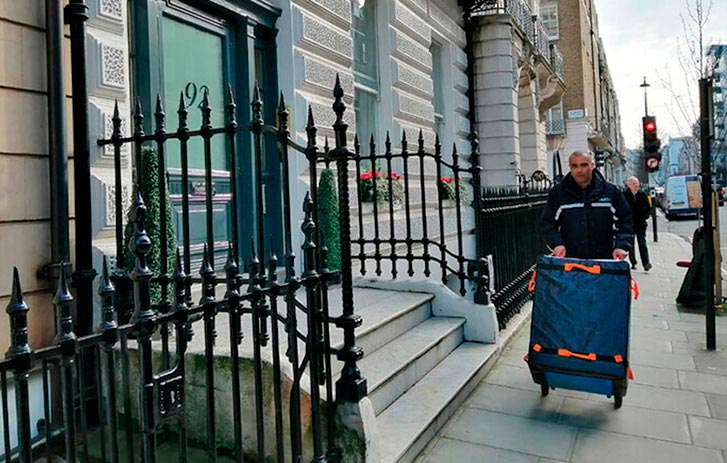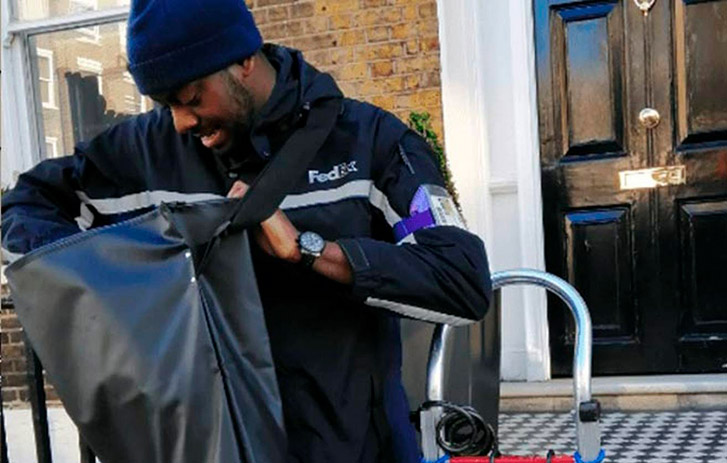City logistics
FedEx® steps and pedals into Europe's green delivery future
September 10, 2020
Couriers and customers prepare for the future as city centers enact new rules
Europe is known for its historic cities that merge the old with the new. Medieval churches can stand next to a modern apartment building, keeping citizens in touch with their past while planning for the future. And now more and more cities across Europe are enacting progressive green transportation rules and regulations to make sure the future is less impacted by air pollution. With mobility in constant flux as governments and consumers begin to focus on new modes of transportation – and new, greener ways to power them – delivery companies are often on the front lines of change.
Couriers and customers prepare for the future as city centers
enact new rules
Europe is known for its historic cities that merge the old with the new. Medieval churches can stand next to a modern apartment building, keeping citizens in touch with their past while planning for the future. And now more and more cities across Europe are enacting progressive green transportation rules and regulations to make sure the future is less impacted by air pollution. With mobility in constant flux as governments and consumers begin to focus on new modes of transportation – and new, greener ways to power them – delivery companies are often on the front lines of change.
To prepare for this new reality, we launched a pilot last year across six major cities in Europe to test innovative ways to get packages where they need to go, on time, while respecting rules hoping to improve these cities’ air quality. Some of the initiatives this cross-functional team is implementing combine new technology like electrification with tried and true techniques of the past, from electric bikes to the human foot.
“There is so much to consider when you attempt a project like this,” explains Delphine Slootmaker, FedEx managing director for Central Planning and Engineering. Her team analyzed 300 cities to determine the final candidates for the test which brought in dozens of FedEx team members from across Europe. “There are parking space questions, street access restrictions, new green zones, curfews for delivery… each major city has its own unique issues and needs unique solutions.”

London
The trials we conducted in London went right to the heart of the city’s busiest and most congested areas in West End and Mayfair. There, two to three couriers simply walk with specialized hand carts to make deliveries and pickups in coordination with a single van that would relocate strategically to meet the couriers as they fanned outward.
In the area of Westminster — home of Buckingham Palace — as well as areas like South Bank where the giant London Eye Ferris wheel sits, electric bikes with large cargo boxes on the back were tested. These areas are slightly more spread out than the West End, and the e-bikes allow couriers to cover more ground. While the e-bikes also coordinate with a single van, they depart and return from a FedEx distribution center.

Amsterdam
Eventually, many cities will likely take advantage of e-bikes. The pilot program wanted to test a number of different types and brands in different markets. In Amsterdam, all of our e-bikes feature a smaller cargo compartment located between the bike’s front wheel and the handlebars and rider.
“The program has uncovered some things you might not initially think about,” Slootmaker explains. “The type of courier who drives a van is likely not the same type of personality of one who wants to ride an e-bike.” Luckily, these new bike couriers are pretty enthusiastic about their routes.
“I think e-bikes are the best way to deliver small packages in a busy city,” says Amsterdam courier Jacky Zheng. “We move easily at a good speed to get the package to the customer faster, and we can park our bikes on the walkway, so we don’t have to hold up traffic.”
Couriers aren’t the only ones getting positive vibes from our e-bike delivery. “Customers are really happy when they see us pull up on the e-bikes,” Zheng adds. “They’re glad to know we’re thinking about the environment.”

Interesting findings
Initial results have been very positive in terms of delivery efficiency and effectiveness, but Slootmaker and team are finding some areas that could require alterations based on anecdotal feedback from the couriers. For example, e-bike couriers need better insulated waterproof gloves to stay warm during foul weather. Similarly, foot and e-bike couriers may need to wear different types of shoes for both summer and winter. Everything down to the bell on the bikes is being considered.

What's next
The rest of the cities ramping up for the pilot include Frankfurt, Milan, Paris, and Madrid. “We’re looking to have solutions that meet the needs of each particular city,” says Slootmaker. They’ll test not only e-bikes and foot couriers in their regions but also larger vehicles like electric vans, traveling by waterway and even a logistics pod that can follow a foot courier autonomously.
Once all the test cities run through the pilot program, the pilot team wants to develop a series of “toolboxes” that would allow every European city to determine what would fit their purposes best, whether that includes some or all of the solutions being tested.
“This is a big program and it’s totally new,” Slootmaker, a 25-year FedEx veteran explains. “But the most exciting part is that we’re testing solutions that will make a difference not just to our team members and customers but to the environment.”